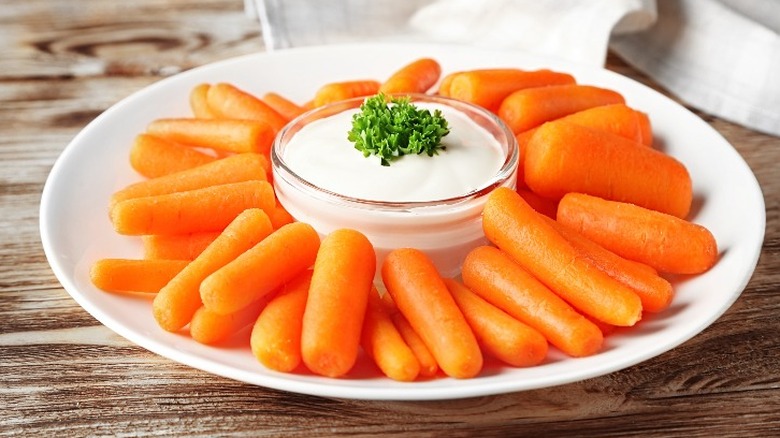Are Baby Carrots Less Nutritious Than Regular Carrots?
Americans love carrots. Although consumption has dropped since the year 2000, chances are you will still consume approximately 7 pounds of carrots over the course of a single year (via Statista).
And what's not to love? Carrots are sweet, they're low-calorie, they're super crunchy, and they can be used in a wide variety of ways in meals and baked items. And, most importantly, carrots are packed with key vitamins and nutrients such as beta carotene, fiber, vitamin A and antioxidants, just to name a few (via Healthline).
How are these various nutrients important to your health? Fiber, for one, is key for gut health and can help you maintain healthy blood sugar levels by managing your digestion of sugars and starches. And remember growing up and your mom or dad pushing carrots on you because they were good for your eye health? This is thanks to the vitamin A derived from the carrot's beta carotenes, which are a kind of antioxidant. Antioxidants are molecular substances that research also suggests can help reduce your risk of cancer.
Baby carrots are a great option as an easy snack that you can dip into some tasty hummus or tangy low-fat yogurt or enjoy on their own. But does the fact that they are "baby" carrots mean that they are going to be less nutritious than regular carrots?
The facts about baby carrots
Baby carrots are a relatively new phenomenon that were accidentally created in the 1980s when a California farmer, frustrated by the ugliness of some of his carrot crop, fashioned his ugly carrots into smaller, sellable-looking carrots. Baby carrots soon exploded. As a result, by 1987, carrot consumption soared to 70% (via Food Network).
Sherilyn Curti, consumer relations coordinator for Grimmway Farms, a big seller of baby carrots, tells the New York Times that because baby carrots go through a peeling and reshaping process, the levels of nutrients that you would normally get from the skin of a standard carrot will be lost. However, this loss in nutrients is not substantial enough for you to forgo enjoying baby carrots. The U.S. Food and Drug Administration (FDA) shows how many nutrients there are in just three ounces of carrots, which is not hard to get from a reasonable portion of baby carrots. For instance, the U.S. Department of Health and Human Services recommends a daily allowance of 700-900 micrograms of vitamin A for adults in its dietary guidelines; eating just 10 medium-sized baby carrots will get you right up to that threshold by providing you with roughly 690 micrograms of vitamin A (via U.S. Department of Agriculture).
So, no need to throw the baby carrots out with the bathwater. Just be sure to avoid dipping them in fatty, sugar-ladened dressings or dips — no matter how tempting. If you must dip your baby carrots, then go for low-fat Greek yogurt with a sprinkle of some fresh dill or chives to make those healthy, delicious babies even healthier.


